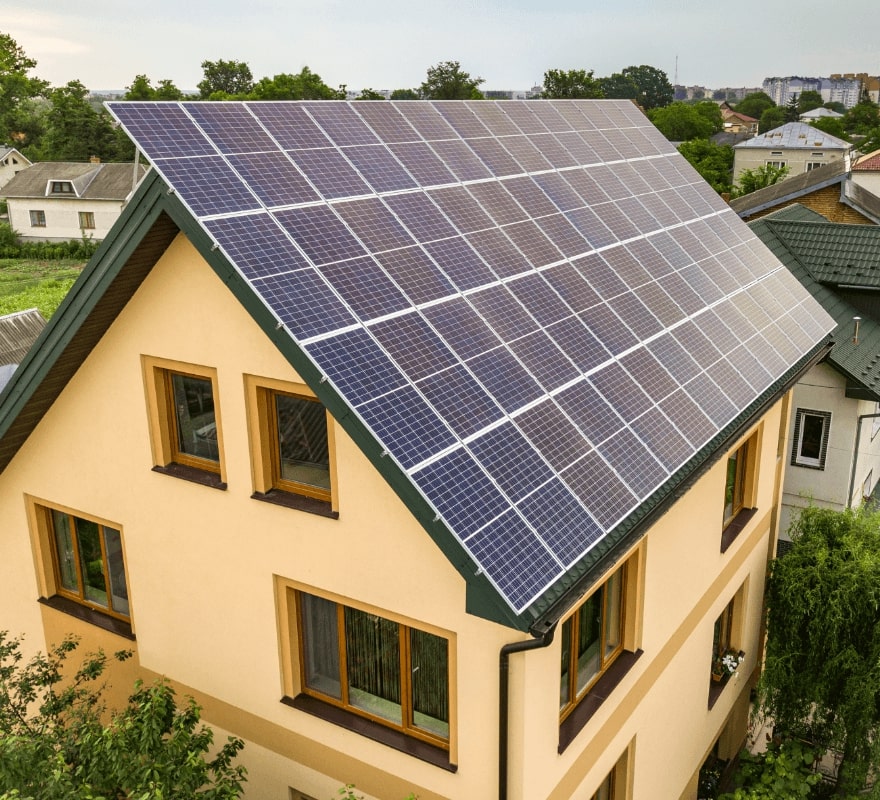Searching for the perfect solar panels for your home, office, shop, or commercial space? Look no further than Contendre Solar! With customizable options, our rooftop solar solutions help you save up to 60% on electricity bills. Trusted by 30,000+ homes and businesses across India, including rural and remote areas.
India’s No. 1 Solar Panels for Homeowners
Electricity bills are rising day by day, and pollution is making things tougher. Adding solar panels to your home is simple and effective for saving money and reducing environmental impact. It's a step toward energy independence and a cleaner future! Contendre Solar is a brand name trusted in rooftop solar panel installation. Our company has on board certified and highly skilled professionals who have worked with clients across India. We pride ourselves in completing over 30,000 rooftop solar panel installations and ensure that the solutions delivered are reliable and efficient. We provide comprehensive end-to-end services for all solar energy needs-from consultation to installation.
Home Solar System
Providing ready-to-use solar systems for your home
Electricity bills are getting costly, and pollution is making it tough for everyone. Setting up solar panels in the house is a simple way to cut costs and contribute to the environment. Solar power allows you to utilize the sun's energy to generate clean electricity while saving money for yourself and the Earth. It is not just saving for today; it is saving for a better future for you and your family.
Contendre Solar is the name householders across India trust for the rooftop solar panel system. We have installed over 30,000 solar panels across India to save the electricity bills of those families who switched to clean energy. Our certified team completes every work starting from the consultancy and installation to all post-installation support and ensures hassle-free solar system integration for each homeowner.
Solar for home is a smart way to take control of your energy needs. Whether you want to save money, use clean energy, or ensure power backup, our systems are ready to go and built for reliability. We make sure the system fits your home perfectly and starts working right away. It's a hassle-free way to reduce your bills and enjoy sustainable energy.
Save on your bills, be energy independent, and have a cleaner environment by switching to solar. At Contendre Solar, we make it easy for you. We assist you in choosing the best solar panel system according to your home and ensure that it functions at all times. Don't wait any longer—get a free quote today and take that first step toward a greener, more affordable energy future!

Contendre Solar is your trusted partner in providing reliable, high-quality solar energy solutions for homes. We offer tailored solar panel systems designed to reduce your energy bills and increase your home’s value, all while contributing to a cleaner environment. Here’s why you should choose Contendre Solar for your home:
Contendre Solar provides a full-service solar solution, guiding you from consultation to installation. We start with a thorough site evaluation to determine the optimal solar setup for your property. Our experienced installation team handles everything with precision, ensuring a seamless, hassle-free process. Once your system is up and running, we continue to support you with maintenance services, keeping your solar panels operating efficiently for years to come.
At Contendre Solar, we make it easy for homeowners to unlock the full potential of government subsidies and incentives for solar installations. Our expert team handles all the paperwork, ensuring you receive the maximum financial support possible. We’re here to make your transition to renewable energy as affordable and seamless as possible, guiding you through every step to maximize your savings and help you make the most of solar power for home.
We offer a range of solar panel for your home tailored to fit the unique needs of every household, delivering optimal energy efficiency and long-term savings. Whether you're powering a cozy home or a spacious property, our solutions are crafted to meet your specific energy requirements.
Contendre Solar offers solar solutions for every need. Our Off-Grid Systems provide energy independence, On-Grid Solutions connect to the power grid, and Hybrid Systems combine both for maximum flexibility. We ensure the perfect system for your home, with reliability and efficiency.